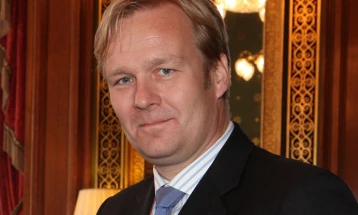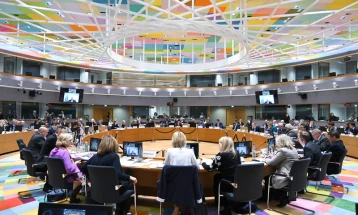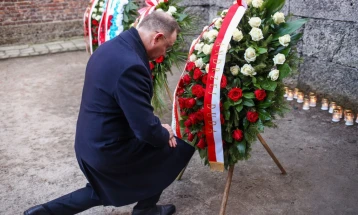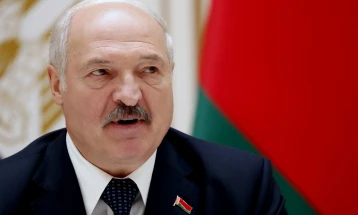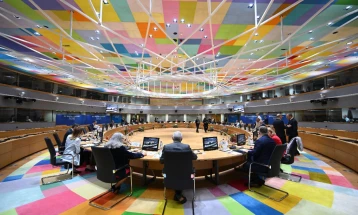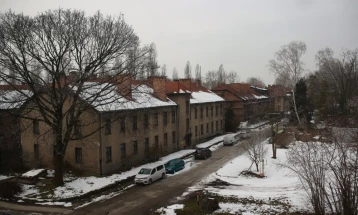Michelle O’Neill becomes first Irish republican leader of N Ireland
- Sinn Féin’s Michelle O’Neill, who made history on Saturday as the first leader of Northern Ireland who supports Irish reunification, pledged to work with those who want to remain part of the UK to build a better future for the region.
- Post By Ivan Kolekevski
- 16:52, 3 shkurt, 2024
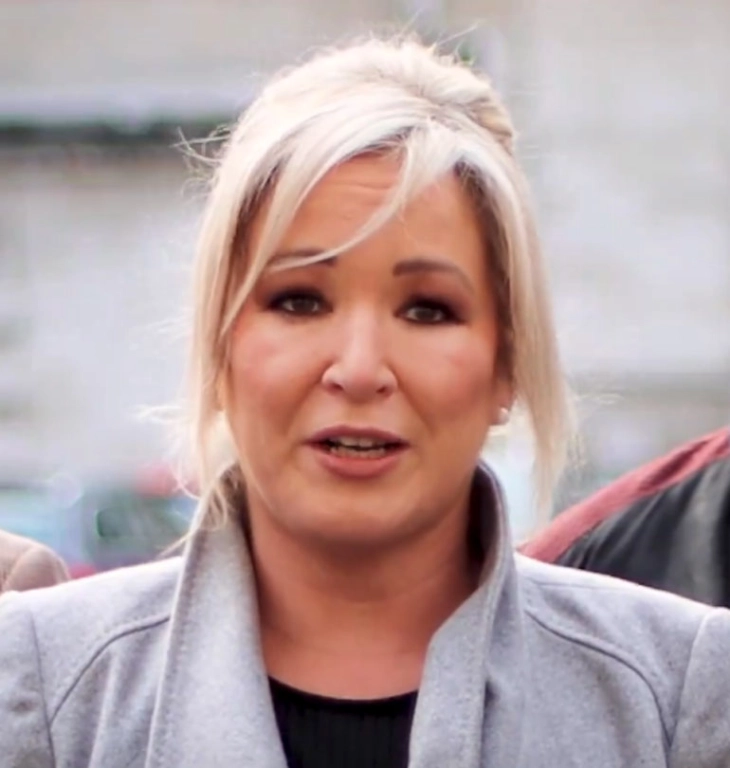
London, 3 February 2024 (dpa/MIA) – Sinn Féin’s Michelle O’Neill, who made history on Saturday as the first leader of Northern Ireland who supports Irish reunification, pledged to work with those who want to remain part of the UK to build a better future for the region.
The appointment of the Sinn Féin vice president provided a moment of history on the day the powersharing institutions of the regional devolved government returned after a two-year hiatus.
Emma Little-Pengelly of the Democratic Unionist Party (DUP), the largest pro–British party, has been nominated to serve as Northern Ireland’s next deputy first minister.
The two top jobs in the ministerial executive wield equal power and responsibility, but the elevation of an Irish republican to the office of first minister, by virtue of Sinn Fein becoming the region’s largest political party in the 2022 Assembly election, is undoubtedly a significant symbolic moment for Northern Ireland.
Members of the Legislative Assembly (MLAs) gathered at Parliament Buildings at Stormont on the outskirts of Belfast for the sitting at which a series of ministers were to be appointed to the powersharing executive.
The blockade was led by the DUP over post–Brexit trading arrangements it said treated Northern Ireland differently from other parts of the UK.
The DUP was angered that a border had been set up in the Irish Sea for goods moving from Great Britain to Northern Ireland in order to avoid a border on the island of Ireland, a complication of Brexit as the two parts of Ireland are now on different sides of the European Union's external borders.
The DUP has now given the green light for the recall of the political institutions on the back of its deal with the British government, which party leader Jeffrey Donaldson says has effectively removed the Irish Sea trading border.
On Thursday, two pieces of legislation contained in the agreement were fast-tracked through the British House of Commons, opening the way for the Northern Ireland Assembly to return.
The proceedings commenced with the process of nominating a speaker, with former DUP leader Edwin Poots elected to the role.
Addressing the chamber after her appointment was confirmed and she affirmed the pledge of office, O’Neill said the restoration of the institutions marked a “moment of equality and progress.”
“A new opportunity to work and grow together ... Confident that wherever we come from, whatever our aspirations, we can and must build our future together," she said.
“We must make powersharing work because collectively, we are charged with leading and delivering for all our people, for every community,” she said.
“In common cause we must make life better for workers, families, communities. To create hope and opportunity.”
“As an Irish republican I pledge co-operation and genuine honest effort with those colleagues who are British, of a unionist tradition and who cherish the Union.
“This is an assembly for all – Catholic, Protestant and dissenter.
“Despite our different outlooks and views on the future constitutional position, the public rightly demands that we co-operate, deliver and work together.
“We must build trust and confidence in our ability to do that.
“That will require courage and ambition not just from us who are elected but from the public.
“We can all invest in this and the more of us that do the better the chance it has.”
The Irish republican leader said the new ministerial executive “undoubtedly face great challenges” as she listed the issues besetting public services in the region.
She said ministers had to work together to challenge the UK government to provide more funding for Northern Ireland.
O’Neill reflected on the achievement of the 1998 Good Friday peace agreement.
“I was a 20-year-old mother at the time of the agreement, and I remember vividly the sense of hope and optimism,” she said.
“I got right in behind politics and have worked since then to build the peace.
“There is no question that our society has been fundamentally transformed because of the peace process.
“I stand here proud, elected first minister as someone who represents the Good Friday generation, and someone who will lead us into the next 25 years.
“I am also an Ulster woman, a Tyrone woman and a deeply proud Irish and European citizen.
“This is an historic day which represents a new dawn.
“For the first time ever, a nationalist takes up the position of first minister.
“That such a day would ever come would have been unimaginable to my parents and grandparents’ generation.
“Because of the Good Friday Agreement that old state that they were born into is gone.
“A more democratic, more equal society has been created making this a better place for everyone.
“This place we call home, this place we love, North of Ireland or Northern Ireland, where you can be British, Irish, both or none is a changing portrait.
“Yesterday is gone.”
O’Neill said her appointment reflected the change that society in the region had undergone.
“I am a republican,” she said.
“I will serve everyone equally and be a first minister for all.
“To all of you who are British and unionist; Your national identity, culture and traditions are important to me.
“I will be both inclusive and respectful to you. None of us are being asked or expected to surrender who we are.
“Our allegiances are equally legitimate. Let’s walk this two-way street and meet one another halfway.
“I will be doing so with both an open hand and with heart.”
Key among the priorities of new ministers will be dealing with the budget crisis which is affecting public services in Northern Ireland.
The British government has offered a £3.3 billion ($4.2 billion) package to secure Northern Ireland’s finances when the assembly returns, including £600 million to settle public sector pay claims.
MIA file photo
